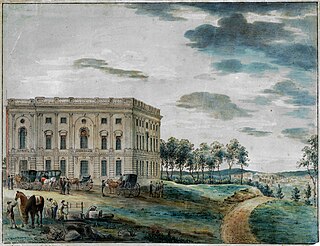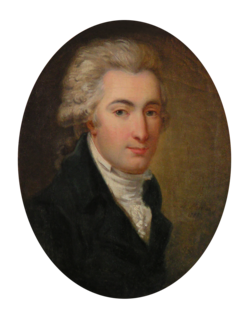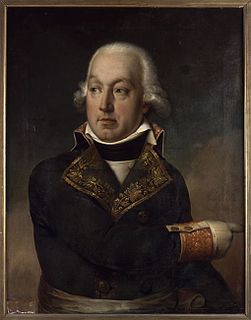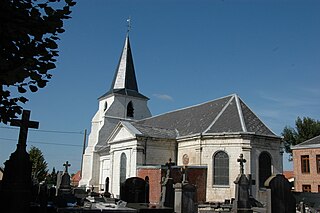
The House of Bonaparte was an imperial and royal European dynasty of Italian origin. It was founded in 1804 by Napoleon I, the son of Genoese nobleman Carlo Buonaparte. Napoleon was a French military leader who had risen to power during the French Revolution and who in 1804 transformed the First French Republic into the First French Empire, five years after his coup d'état of November 1799. Napoleon turned the Grande Armée against every major European power and dominated continental Europe through a series of military victories during the Napoleonic Wars. He installed members of his family on the thrones of client states, extending the power of the dynasty.

The Louisiana Purchase was the acquisition of the Louisiana territory of New France by the United States from France in 1803. The U.S. paid fifty million francs ($11,250,000) and a cancellation of debts worth eighteen million francs ($3,750,000) for a total of sixty-eight million francs. The Louisiana territory included land from fifteen present U.S. states and two Canadian provinces. The territory contained land that forms Arkansas, Missouri, Iowa, Oklahoma, Kansas, and Nebraska; the portion of Minnesota west of the Mississippi River; a large portion of North Dakota; a large portion of South Dakota; the northeastern section of New Mexico; the northern portion of Texas; the area of Montana, Wyoming, and Colorado east of the Continental Divide; Louisiana west of the Mississippi River ; and small portions of land within the present Canadian provinces of Alberta and Saskatchewan. Its non-native population was around 60,000 inhabitants, of whom half were African slaves.
The 1800s decade lasted from January 1, 1800, to December 31, 1809. The term "eighteen-hundreds" can also mean the years between 1800 and 1899, and is almost synonymous with the 19th century (1801–1900). This article refers to the decade comprising 1800–1809.

Jean-Jacques Dessalines was a leader of the Haitian Revolution and the first ruler of an independent Haiti under the 1805 constitution. Under Dessalines, Haiti became the first country in the Americas to permanently abolish slavery. Initially regarded as governor-general, Dessalines was later named Emperor Jacques I of Haiti (1804–1806) by the Generals of the Haitian Revolution Army. He is regarded as one of the founding fathers of Haiti.

The Eighth United States Congress was a meeting of the legislative branch of the United States federal government, consisting of the United States Senate and the United States House of Representatives. It met in Washington, D.C. from March 4, 1803, to March 4, 1805, during the last two years of the first presidency of U.S. President Thomas Jefferson. The apportionment of seats in the House of Representatives was based on the Second Census of the United States in 1800. Both chambers had a Democratic-Republican majority.

Henry Addington, 1st Viscount Sidmouth, was a British statesman who served as Prime Minister from 1801 to 1804. He is best known for obtaining the Treaty of Amiens in 1802, an unfavourable peace with Napoleonic France which marked the end of the Second Coalition during the French Revolutionary Wars. When that treaty broke down he resumed the war but he was without allies and conducted a relatively weak defensive war, ahead of what would become the War of the Third Coalition. He was forced from office in favour of William Pitt the Younger, who had preceded Addington as Prime Minister. Addington is also known for his ruthless and efficient crackdown on dissent during a ten-year spell as Home Secretary from 1812 to 1822. He is the longest continuously serving holder of that office since it was created in 1782.

The Napoleonic era is a period in the history of France and Europe. It is generally classified as including the fourth and final stage of the French Revolution, the first being the National Assembly, the second being the Legislative Assembly, and the third being the Directory. The Napoleonic era begins roughly with Napoleon Bonaparte's coup d'état, overthrowing the Directory, establishing the French Consulate, and ends during the Hundred Days and his defeat at the Battle of Waterloo. The Congress of Vienna soon set out to restore Europe to pre-French Revolution days. Napoleon brought political stability to a land torn by revolution and war. He made peace with the Roman Catholic Church and reversed the most radical religious policies of the Convention. In 1804 Napoleon promulgated the Civil Code, a revised body of civil law, which also helped stabilize French society. The Civil Code affirmed the political and legal equality of all adult men and established a merit-based society in which individuals advanced in education and employment because of talent rather than birth or social standing. The Civil Code confirmed many of the moderate revolutionary policies of the National Assembly but retracted measures passed by the more radical Convention. The code restored patriarchal authority in the family, for example, by making women and children subservient to male heads of households.

Louis Antoine de Bourbon, Duke of Enghien was a relative of the Bourbon monarchs of France. More famous for his death than for his life, he was executed on charges of aiding Britain and plotting against France. Royalty across Europe were shocked and dismayed at his execution. Tsar Alexander I of Russia was especially alarmed, and decided to curb Napoleon's power.

Barthélemy Louis Joseph Schérer, born in Delle, near Belfort, became a French general during the French Revolutionary Wars and on three occasions led armies in battle.

Salperwick is a commune in the Pas-de-Calais department in the Hauts-de-France region of France.

Bus-lès-Artois is a commune in the Somme department in Hauts-de-France in northern France.

Caillac is a commune in the Lot department in south-western France.
Events from the year 1869 in France.
The second 1804 United States Senate special election in New York was held on November 9, 1804, by the New York State Legislature to elect a U.S. Senator to represent the State of New York in the United States Senate.

The First Cabinet of Napoleon I was appointed by the Emperor Napoleon I upon the establishment of the First French Empire on 18 May 1804, replacing the Cabinet of the Consulate. It was succeeded by the French Provisional Government of 1814 following the downfall of Napoleon and the abolition of the Empire.
Events from the year 1718 in France.
Events from the year 1761 in France.
Events from the year 1737 in France.

Indochina, originally Indo-China, is a geographical term which originated in the early nineteenth century and refers to the region today known as Mainland Southeast Asia, or the Indochinese Peninsula. The name refers to lands historically within the cultural influence of India and China, and physically bound by the Indian Subcontinent in the west and China in the north. It corresponds to the present-day areas of Cambodia, Thailand, Laos, Myanmar, Vietnam, and (variably) peninsular Malaysia and Singapore. The term was later adopted as the name of the colony of French Indochina.














